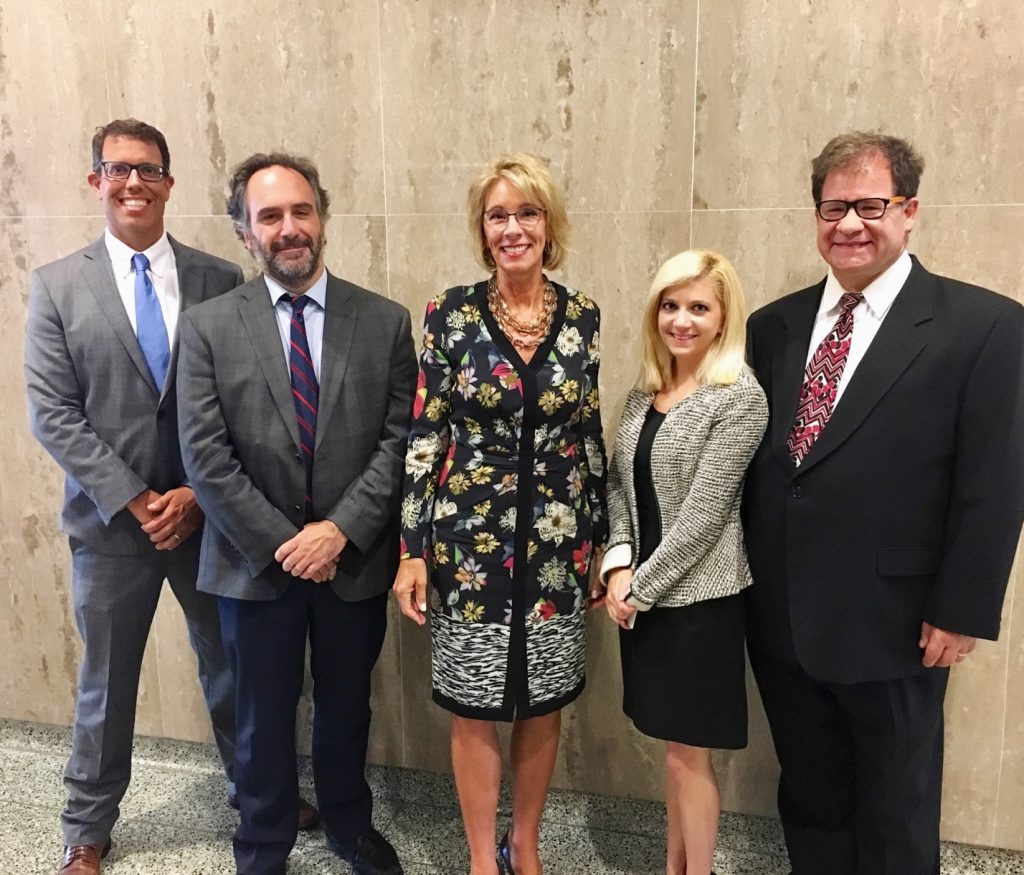“I think the impact of this war on our society was much, much, much greater than people realize,” said Lengel. “We have tended to view this war from a distance. We have tended to view it through stereotype — that it was simply a brutal slugfest with millions of casualties with millions of people dying and accomplishing nothing whatsoever. And we have very little understanding in this country — not just of its impact in Europe, but on its impact on every day people in the United States.”
In fact, many were issues during World War I as well. Williams took liberties for instance.
 To obey the law that requires all schools that receive federal funding and all federal agencies to observe Constitution Day, September 17, here in the Department of Education, we concentrated on the Constitutional issues that arose during World War I. We chose to focus on World War I since 2017 marks the centennial of the U.S. entry into that war.
To obey the law that requires all schools that receive federal funding and all federal agencies to observe Constitution Day, September 17, here in the Department of Education, we concentrated on the Constitutional issues that arose during World War I. We chose to focus on World War I since 2017 marks the centennial of the U.S. entry into that war.
Anthony Fowler is Interagency Liaison in the U.S. Department of Education.
Two pieces of legislation, the Espionage Act and the Sedition Act, were passed in Congress with the intention of limiting free speech. Williams set the stage by describing President Wilson’s views on opposition to the war: “Wilson commented several times on dissent against that war and dissenters who voiced their opinions. He said the opponents of his war policies were ‘pouring the poison of disloyalty into the very arteries of our national life. Those creatures of disloyalty fire and anarchy, must be crushed. ”’
The Wilson Justice Department went into action to enforce the law and “prosecuted 2,000 plus cases under the Espionage Act,” said Williams. “Congress created the Espionage Act not just to curtail free speech, but more specifically, to prevent interference with the draft or conscription. Over 1000 convictions were upheld by the courts, including a very famous socialist, Eugene Debs, and leaders of the Industrial Workers of the World, the IWW.”
“The Wilson administration moved quickly, unfortunately, to suppress dissent and civil liberties,” said Williams. “The Attorney General, Thomas Gregory, drafted the bill that would become the Espionage Act, which made it a crime to interfere with the operations of the military, or to cause insubordination, disloyalty, rioting, or refusal of duty — or shall willfully obstruct the recruiting or enlistment services of the United States. The Attorney General on one occasion said, ‘May God have mercy on them for they need expect none from an individuals or an avenging government. ”’
Although it was 100 years since World War I, the panelists agreed that World War I and the issues that arose from that age are very much with us today.
You see, the text of the Constitution is about limiting government, not a so-called living document that could suddenly usurp the people’s power on the whim of social norm or any politician. Yet this self-evident philosophy was lost along the way. Regrettably, too many kids aren’t even at the “School House Rock” degree. Broadway elevated Alexander Hamilton’s name but too few know the real Hamilton. The author of the Federalist Papers also wrote that, and I quote, “The sacred rights of mankind are not to be rummaged for, among old parchments or musty records, they are written, as with a sunbeam, in the whole volume of human nature, by the hand of the divinity itself and can never be erased.”
Continue the conversation on Facebook or Twitter.
Secretary DeVos introduced this year’s program, held on September 18, by highlighting the importance of the Constitution with the following comments:
Published at Thu, 02 Nov 2017 21:37:39 +0000
Mr. Williams quoted a fellow historian, who said that, during World War I, “liberty and justice were compromised in ways more extreme and extensive than at any other time in American History.”
And in wrapping the Constitution with World War I, we recognized women and the men who have served in the armed services to defend our Constitution. Legacies and their descendants are although they’re no longer with us, and the lawful lessons learned during that period are still very much with us.
This year’s program featured two distinguished historians; Edward G. Lengel, Chief Historian at the White House Historical Association, and Tony Williams, Senior Teaching Fellow in the Bill of Rights Institute.
View the Constitution Day program.
Source: TPd Paying for College Feed

Leave a Reply